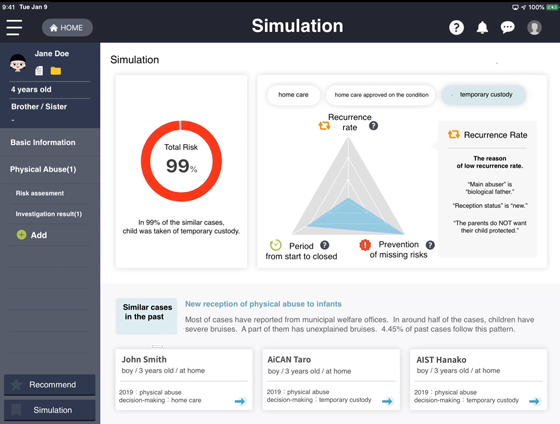Information Technology and Human Factors
Development of Child Abuse Response and Decision Making Support System Employing AI
- TAKAOKA Kota
Artificial Intelligence Research Center
Update(MM/DD/YYYY):12/24/2020
AI assistance for child guidance centers
AI helps child guidance centers make prompt decisions by analyzing past cases to estimate conditions such as the severity of abuse and likelihood of recurrence.
 |
| Screen from the AiCAN application for tablet computers |
Responding to child abuse: difficult even for experienced staff members
Much information is initially unknown when abuse is reported to centers. Guardians may not tell the truth, and children with anxiety may not say anything. This makes it very difficult even for experienced staff members to comprehensively assess factors such as the severity of abuse, likelihood of recurrence, and need for temporary protective custody to decide a course of action promptly.
Support in decision-making via an application offering AI insight from analysis of six years of data
A support system was developed that consists of the AiCAN (Assistance of intelligence for Child Abuse and Neglect) tablet application, a cloud database ensuring secure data storage and sharing, and AI for data analysis applications, including probabilistic modeling developed by AIST. With this system, digitization of six years of abuse records at child guidance centers enables real-time analysis applying machine learning, probabilistic modeling, and other AI. When information about a child is entered for a new case, users are immediately presented with estimates of the severity of abuse and likelihood of recurrence, based on analysis of previous cases. This can help staff members at child guidance centers make prompt decisions applying past knowledge. Through the application, they can also document and share information from the field, which accelerates and streamlines sharing and storing of data at the center and with relevant organizations.

Field testing to support abuse agencies nationwide
AIST will continue field testing. It will promote greater efficiency at agencies that respond to abuse, and study whether AI can provide more valuable insight. Then AIST will expand this system nationwide at sites dealing with abuse, such as medical institutions, schools (including nursery schools and kindergartens), and police stations.
Contact
TAKAOKA Kota
Senior Researcher
Probabilistic Modeling Research Team, Artificial Intelligence Research Center
AIST Tokyo Waterfront, 2-3-26 Aomi, Koto-ku, Tokyo 135-0064 Japan
E-mail: airc-info-ml*aist.go.jp (Please convert “*” to “@”)